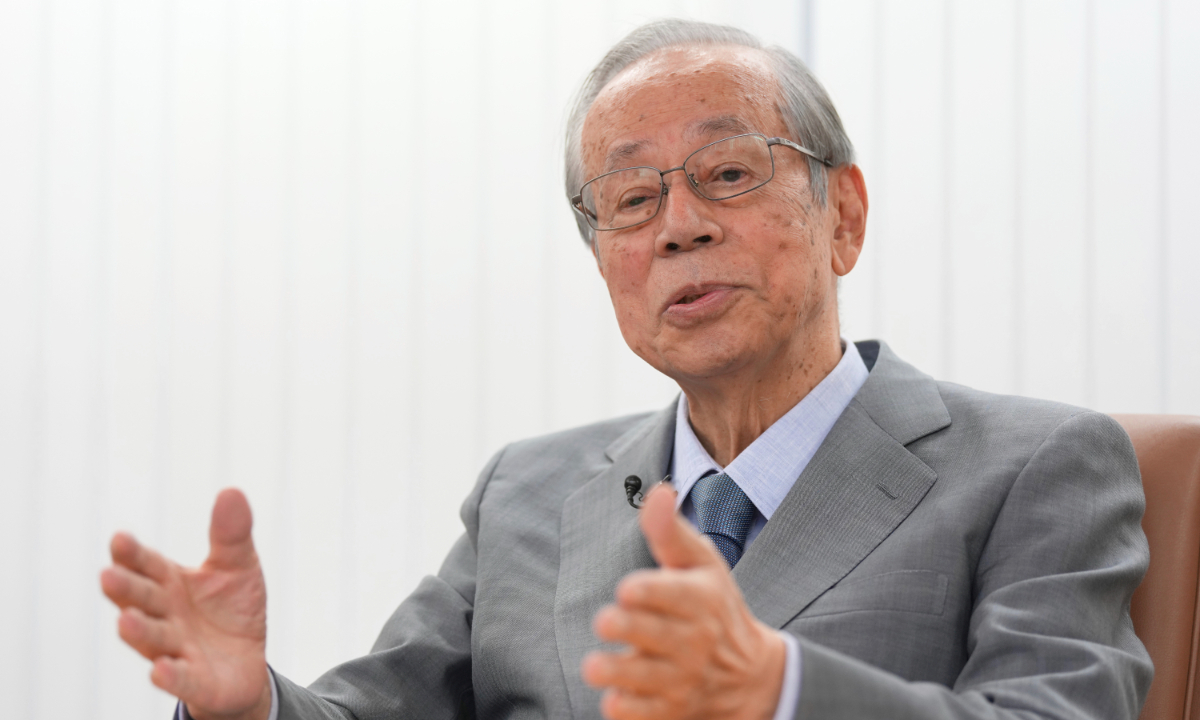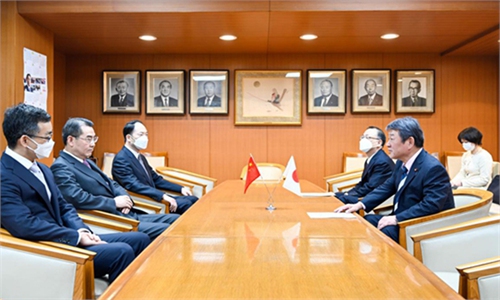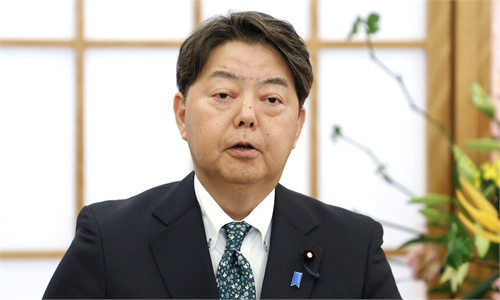GT Exclusive: Japanese FM’s upcoming visit to China expected to dispel misunderstanding and uncertainties: former PM Yasuo Fukuda

Yasuo Fukuda, Japan's former prime minister Photo: VCG
The Japanese foreign minister's visit to China is expected to help dispel misunderstandings and dissolve uncertainties in bilateral ties, Yasuo Fukuda, Japan's former prime minister, told the Global Times in a recent exclusive interview, ahead of Japan's Minister for Foreign Affairs Yoshimasa Hayashi's upcoming official visit to China.
Chinese Foreign Ministry Spokesperson Mao Ning on Friday announced the visit of Hayashi on April 1 and 2 at the invitation of Chinese State Councilor and Foreign Minister Qin Gang.
The lack of face-to-face communication due to the COVID-19 pandemic often leads to the inability to understand each other's real thoughts, which results in "uncertainty" between the two countries. Hayashi's visit to China has to some extent released positive signals that high-level interaction between the two sides will help narrow the uncertainty and further transform it into "certainty," Fukuda told the Global Times at the Boao Forum for Asia (BFA) 2023 on Thursday.
Wang Yi, director of the Office of the Foreign Affairs Commission of the Communist Party of China (CPC) Central Committee, recognized Fukuda's contribution to China-Japan friendship over the years when he met up with Fukuda on Friday in Beijing. Wang said he hopes more Japanese people could play a positive role in improving China-Japan relations.
Fukuda underlined the significance of the BFA, which was held offline for the first time since the outbreak of the COVID-19 pandemic. "I can feel that the representatives of the opening ceremony have high expectations for China, which takes a leading role in Asia, and they look forward to a bigger role for China," said Fukuda. "I think there is much hope for China and it has achieved quite a lot in terms of economic development."
He also applauded the Global Security Initiative (GSI) which was raised at the forum's 2022 annual conference by Chinese President Xi Jinping, when delegates discussed the ideal approach as well as China's role in tackling global and regional security challenges.
"One of the reasons why China, with its huge economy, has achieved remarkable development in a short period of time is that it does not think only about its own country, nor only about Asia, but puts its vision globally and considers the world as a whole," said Fukuda. "In order to achieve the ultimate goal of stable global development, China has always been committed to promoting dialogue among nations as a way to create a peaceful and stable international environment," he noted.
Fukuda said he highly valued Chinese Premier Li Qiang's speech at the BFA opening ceremony on Thursday, which stressed that the certainty China offers has been and will remain an anchor for global peace and development amid global uncertainties.
Fukuda called Li's remarks "a strong message that is forward-looking in addressing future goals" and in line with the direction given by President Xi, which "succeeds the traditional projection of the principles that China has set up."
After a four-year gap, China and Japan resumed face-to-face diplomatic and security talks in February. A series of consultations, including the 16th China-Japan economic partnership consultation, shows that the long-frozen bilateral contacts are recovering, and to a certain extent, it sends a positive signal of stabilizing China-Japan relations.
However, as the US trumpets its intended "decoupling" from China, some voices from Japan, a US ally, seem to be exploring the possibility of such a proposition. In this regard, some Japanese media outlets are concerned that Japan will have a lot to lose if the country does follow through.
Fukuda said he disagreed with the idea of so-called decoupling, noting that "it would shrink the world economy and even risk triggering a military conflict, which would not do any good to the world economy." He appealed to those who advocate decoupling to think more about whether this strategy will benefit any party.
Back on February 2, Qin urged Japan to uphold an objective and rational perception of China, honor its commitments and act prudently in words and action on major issues such as history and Taiwan question during his phone conversation with his Japanese counterpart.
China and Japan are close neighbors separated by a strip of water, and peaceful coexistence and friendly cooperation are the only correct choices for both sides, the Chinese Foreign Minister said.
According to Fukuda, China and Japan have their respective strengths and have space for further cooperation. If the two countries can work side by side, it will surely benefit Asia and the rest of the world. The former Japanese leader said he expects the two countries to work together to become the backbone of building a global community of shared future that Xi proposed.
In response to claims in Japan that "if something happens to Taiwan, something happens to Japan," Fukuda stressed that this does not truly represent the mainstream view of Japanese society.
"I would like to emphasize Japan's stance on the Taiwan question, that is, the Japanese government has recognized the People's Republic of China 'as the sole legal Government of China.' Because of this, our country only maintains cultural and economic exchanges with the island of Taiwan and has not established an embassy in the region," said Fukuda.



